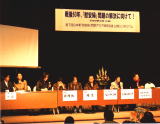第7回日本軍「慰安婦」問題アジア連帯会議決議

2005年2月12、13日、私たちは東京で開かれた第7回日本軍「慰安婦」問題アジア連帯
会議に参集した。韓国、フィリピン、中国大陸、台湾、日本から約150名が参加し、
特にフィリピンからは初めて関係3団体が顔を合わせた(オランダ・北朝鮮はレポー
ト参加)。1991年、日本軍「慰安婦」の被害者が名乗り出てから14年あまりが経過し
たが、日本政府は真摯な謝罪、補償、真相究明を行っていない。この間、日本軍「慰
安婦」問題の解決のための法案や真相究明のための法案が幾たびか提出されてきた
が、未だ制定の見通しは立っていない。これは、アジア諸国への侵略戦争の反省に基
づいて制定された平和憲法を「改正」しようとする政府・財界の動きと結びついてい
る。
一方、謝罪・補償の実現を求め続けてきた被害者の声を無視して強行された「女性の
ためのアジア平和国民基金」(以下、「国民基金」)は、施策の過ちを認めないまま
2006年度で解散することを表明した。
そうした中、多くの日本軍「慰安婦」裁判は、最高裁で次々に上告が棄却され、ある
いは受理されず敗訴が確定している。司法においても正義は実現されず、現在進行中
の裁判は中国大陸と台湾の訴訟のみとなった。
高齢になった被害者は生きているうちに正義が実現することを切望してきたが、この
数年、実現を見ないまま亡くなる方が相次いでいる。もう時間はない。アジア太平洋
戦争終結から60年を迎える節目の今年こそ、私たちは何としても日本軍「慰安婦」問
題の解決を実現するため、以下を確認し、行動を提起する。
【確認事項】
1.
私たちは、「国民基金」は被害女性の尊厳回復にはならず、「償い金」を受け取
ったかどうかに関係なく、失敗であったことを確認した。
2.
私たちは、日本政府が公式謝罪・補償・真相究明を実行するまで、日本の国連安
全保障理事会常任理事国入りを認めない。
【戦後60年緊急行動】
1.
日本軍「慰安婦」問題解決促進法を実現し、公式謝罪と補償を実現する。
2.
日本政府に対する国連人権機関の勧告実施を求める国際署名運動を展開する。
3.
日本軍「慰安婦」問題の解決を求める世界同時デモ及び要請行動を8月に行う。
4. 日本軍「慰安婦」問題の事実を各国の教科書に記述し、次の世代に伝える。特
に、日本における中学校教科書採択において日本軍「慰安婦」を否定する教科書の採
択を阻止する。
5.
残された日本軍「慰安婦」裁判を、アジアで連帯して支援する。
【国際連帯行動】
1.
日本軍「慰安婦」制度の被害女性とともに証言活動をすすめる。
2. 国連人権委員会、北京プラス10、ILO等の国際会議で国際社会に連帯行動を訴
える。
3. 日本軍性奴隷制の責任者を裁いた「女性国際戦犯法廷」を歪曲・縮小したNHK報道
に対する政治介入に抗議し、真相を究明する。
4. 日本軍「慰安婦」制度に関する文書を公開するよう日本及び関係国に求める。
5.
各国・各地で取り組みが始まっている記録・記憶の保存と教育活動のため、ミュ
ージアム・ネットワークを構築する。
6.
女性の人権確立のため、社会にある性差別と闘い、非暴力・平和の社会の実現を
目指す国際社会の幅広い運動と連帯する。
2005年2月13日 東京
第7回 日本軍「慰安婦」問題アジア連帯会議 参加者一同
******English*****
Resolution
The
7th Asian Solidarity Conference on Japanユs Military Sexual Slavery
We
have gathered here at the 7th Asian Solidarity Conference on Japanユs
Military Sexual Slavery in Tokyo from South Korea, Mainland China,
Philippines, Taiwan and Japan on February 12th and 13th, 2005 (the
Netherlands and North Korea contributed their reports). It is our pleasure
to especially note that three different groups from the Philippines came
together for the first time at this conference.
Already 14 years have
passed since a survivor of Japanユs military sexual
slavery broke the silence
in 1991. However, the Japanese government has not
offered a sincere apology,
reparation, or a full fact findinginvestigation.
This situation is
interlinked with the movement led by the Japanese
government and business
community to revise the peace constitution, which
was originally founded
based on remorse toward aggression committed against
the Asian
countries.
During these years, a draft bill aimed to settle the military
sexual
slaveryissue and to facilitate fact finding have been introduced at
the
Diet respectively for several times, but these bills are faced with no
foreseeable realization. On the other hand, the メAsian Womenユs Fund,モ which
was originally established by overriding the voices of survivors who had
continually demanded apology and reparation, has announced to dissolve
itself at the end of fiscal year 2006, howeverwithout acknowledging its due
failures.
Concurrently, a number of メcomfort womenモ litigation cases have
been
declined by the Japanese Supreme Court. Justice has not been realized
evenin the judiciary of Japan. Only the litigation cases of Taiwan and
Mainland China remain pending today.
It has been the hope of aged
survivors to see justice realize itself while
they are still alive. However,
one after another, many survivors have
passed away in recent years without
seeing justice come to life. Time is
running out.
This year, to mark the
60th year after the end of the Asia-Pacific War, we
confirm and propose the
following points and action plans to achievea
proper settlement of the
military sexual slavery issue.
We confirm as follows;
1. that the
AsianWomenユs Fund has been a failure, regardless of whether
one acceptedthe
メatonement moneyモ or not, as it has failed to remedy the
dignity of the
survivors.
2. that we will object to Japanユs permanent membership of UN
Security
Councils until Japan offers an official apology, reparation and
fact
finding investigation.
Urgent action plans marking the 60th year
since the end of WWII;
1. Compel the Japanese Diet to pass the bill to
promote resolution on the
issues of メcomfort womenモ and to oblige the
Japanese government to offer an
official apology and reparation.
2.
Promote an international petition campaign to demand that
recommendations by
UN human rights bodies be implemented.
3. Organize a world simultaneous
demonstration and action appeal in
August to demand due settlement of the
military sexual slavery issue.
4. Include facts related to メcomfort womenモ in
each countryユs textbooks
to educate future generations. In particular,
toprevent the adoption of
junior high school textbooks, which deny facts
regarding メcomfort womenモ.
5. Support the pending military sexual slavery
litigation in solidarity
across Asia.
Action plans in solidarity with
the international community;
1. Promote publichearings of testimonies
together with the survivors.
2. Appeal to the international community to
undertakesolidarity actions
in international fora such as Beijing +10, the
UN Commission on Human
Rights and ILO.
3. File objections and conduct
truth finding regarding NHK Broadcasting
coverage of Womenユs International
War Crimes Tribunal on Japanユs Military
Sexual Slavery, which distorted and
undermined the issue by political
interventions.
4. Urge the Japanese
government and other related governments to disclose
the documents
concerning military sexual slavery.
5. Build the museum network, aimed at
retaining record/memory and
promoting education on this issue, to expand the
initiatives emerging in
respective country and locality.
6. Establish
solidarity with broader international movements promoting
womenユs human
rights, working to end gender-baseddiscrimination, and making
a peace and
non-violent society.
February 13, 2005
All Participants of the 7th
Asian Solidarity Conference on Japanユs Military
Sexual Slavery by Japan